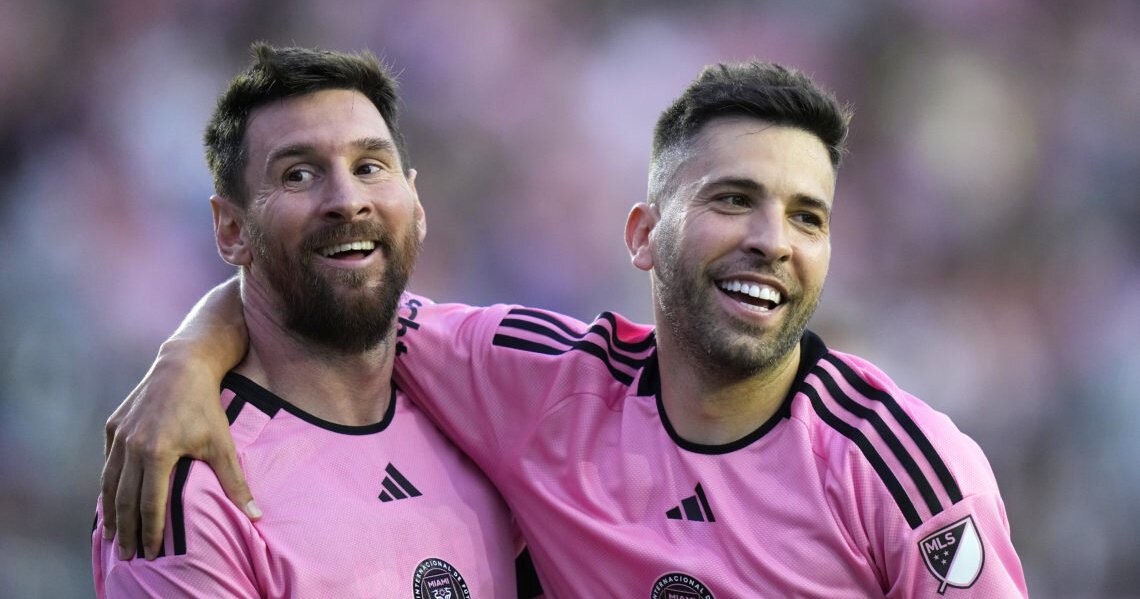The glittering spectacle of the MLS All-Star Game recently took a surprising turn, as two of its most anticipated participants, Lionel Messi and Jordi Alba of Inter Miami, opted out. This unexpected withdrawal has ignited a critical conversation, not just about their immediate availability but about the delicate balance between star attraction, player welfare, and the stringent policies governing professional sports leagues.
The Unforeseen Absence and its Immediate Ramifications
The announcement that Messi and Alba would not feature against the Liga MX All-Stars in Austin sent ripples through the soccer community. Both players, having been voted onto the roster and widely expected to be central figures, created a void that league officials and fans alike were quick to notice. The official reason for their absence remains unstated, a detail that now casts a long shadow over their immediate future in the league.
According to established MLS policy, a player who misses the All-Star Game without a confirmed injury risks a one-match suspension. Should this penalty be invoked, Messi and Alba would be sidelined for Inter Miami`s crucial home fixture against FC Cincinnati. This is no minor inconvenience; Cincinnati previously handed Miami a 3-0 defeat, and Inter Miami is currently trailing by a significant margin in the Eastern Conference, despite having games in hand from their Club World Cup participation. Points on the board are, as any seasoned club manager will attest, far more valuable than potential future gains.
Commissioner Garber`s Deliberate Stance
The situation quickly drew comments from MLS Commissioner Don Garber, who found himself walking a tightrope between upholding league regulations and acknowledging the unique circumstances surrounding a global icon like Messi. Garber`s remarks painted a picture of a league grappling with complex realities:
“Anything that`s going to happen as it relates to next weekend, we`re not going to talk about today because the game`s not until this coming weekend, and we don`t need to announce that now. We`re managing through that process as we speak, but I want to say something that we as a league deal with. We have an all-star game that we believe is a real priority, as do all leagues… At the same time, we have a player who is… He`s played nine matches in 30 days. Miami`s had a schedule that is unlike any other team. Most of our teams had a 10-day break. Miami hasn`t. We had Leo playing 90 minutes in almost all the games that he`s played… We have to manage through that as a league. The same time, we do have rules and we have to manage through that as well…”
This statement, delivered with a certain measured gravitas, underscores the inherent tension. On one hand, the All-Star Game is positioned as a vital mid-season event, a priority for stakeholders ranging from fans to partners and owners. On the other, there`s the undeniable fact of Inter Miami`s extraordinarily congested fixture list. Messi`s arduous schedule—nine matches in 30 days, many of them full ninety-minute shifts—stands in stark contrast to the rest of the league, which enjoyed a much-needed break. It`s a pragmatic acknowledgment that even the most celebrated athletes require a degree of physical preservation, especially when their club`s schedule verges on the punishing.
The League`s Delicate Balance: Spectacle vs. Sustainability
The situation with Messi and Alba is a microcosm of a larger dilemma facing modern sports leagues. How does one harness the immense drawing power of global superstars while simultaneously safeguarding their long-term health and upholding the integrity of established regulations? The irony is not lost: the league wants its brightest stars to shine at its marquee event, but the very demands of their star power can lead to the need for rest, potentially clashing with the rulebook.
Garber`s admission, “We should`ve known earlier, we should`ve addressed it earlier. No doubt about that,” points to a potential proactive measure that might have averted this public debate. The league`s dialogue with Inter Miami is crucial in determining the veracity of any underlying physical issues for Messi and Alba. Jordi Alba, for instance, reportedly left his last game with an injury, a detail that could provide the necessary justification for his absence and thus avoid a suspension.
What Lies Ahead?
The coming days will be critical. The league office is in direct communication with Inter Miami to ascertain the specific reasons behind the players` withdrawal. This process will ultimately decide whether the stars face disciplinary action or if their absence is deemed legitimate. The outcome will not only impact Inter Miami`s immediate league standing but also set a precedent for how MLS balances its commercial aspirations with the practical realities of player management in an increasingly demanding sporting landscape.
For fans, the wait is twofold: for clarity on the suspension, and for the return of Messi and Alba to the pitch, ideally without further interruption. The episode serves as a compelling reminder that even in the dazzling world of professional sports, the quiet hum of policy and player welfare often dictates the loudest headlines.

